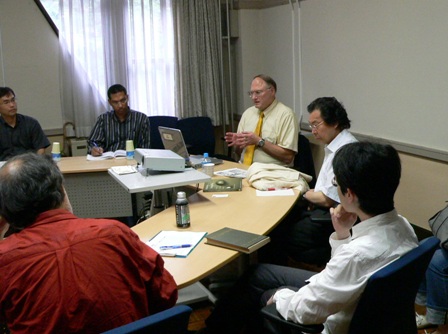Report: Thomas P. Kasulis, 'Writing a History of Japanese Philosophy'
Dr. Thomas P. Kasulis (Ohio State University) made a presentation during the second session of the UCTP lecture series in Japanese Intellectual History on July 7th. The topic was “Writing a History of Japanese Philosophy: What I have learned”.
Professor Kasulis focused on how to explain patterns in Japanese Philosophy. He relied on culture to explain patterns in Japanese philosophy, specifically referring to the Gestalt function and the Recursive function. In Japanese Philosophy internal relations and "Intimacy" are important rather than external relations "Integrity". When people enter into relations of "Integrity", the "Self" and "Other" are separate and independent. In relations of "Intimacy", the "Self" and ‘Other’ come together. Therefore, intimate relations are internal. So in Japanese relationships the various parts are interconnected and when the relationship ends, the various parts are also changed. He clarified the patterns and differences in Japanese philosophy by alluding to cases in different historical periods, from the Nara to Modern.
He concluded his lecture by mentioning how Japan could contribute to world philosophy today. What is important is holographic thinking, in which animism meets modern science. It can lead us to find ways to view nature and respond to postmodern fragmentation. He also claimed that culture could be starting point for philosophy.
Although it might not be easy to regard whole Japanese culture as "Intimacy", the lecture provided us with important views on writing the history of Japanese philosophy.
(Misato IDO)








